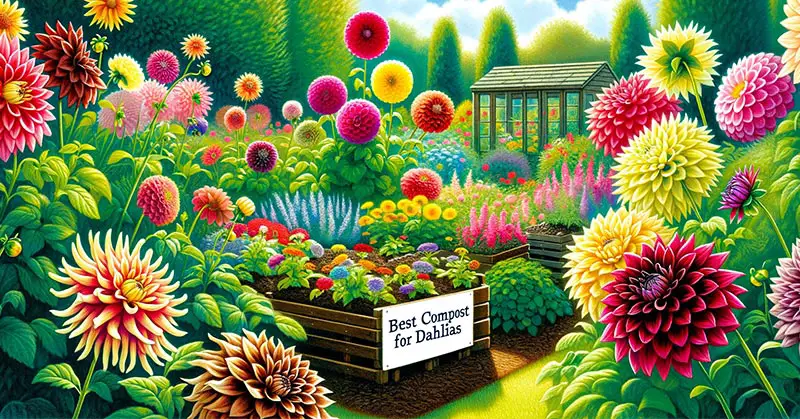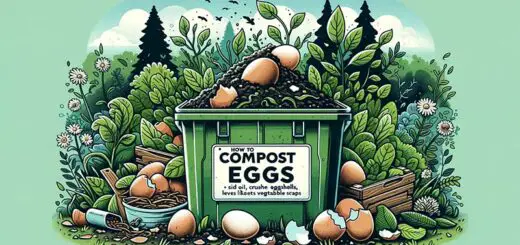Best Compost for Dahlias
The best compost for dahlias is a well-balanced, organic mixture that is rich in nutrients and has good drainage. Ideally, a blend of decomposed leaves, well-rotted manure, and garden compost works excellently. This combination provides the necessary nutrients and maintains a soil structure conducive to the growth of dahlias. Ensuring the compost is neither too wet nor too dry is key to promoting healthy root development and vibrant blooms.
But, selecting the right compost is just the beginning. Dahlias, with their striking blooms and lush foliage, require more than just good soil to truly thrive. Understanding the nuances of compost composition and how it interacts with your garden’s unique environment can elevate your dahlias from simply surviving to spectacularly thriving.
In the following sections, we’ll delve into the intricacies of compost ingredients, how to tailor your compost to the specific needs of your dahlias, and expert tips for year-round care. This guide will equip you with the knowledge to create a flourishing dahlia garden. So, let’s embark on this journey together and transform your gardening experience.

Selecting the Ideal Compost for Dahlias
When it comes to nurturing dahlias, the choice of compost plays a pivotal role in their growth and bloom quality. Dahlias thrive in nutrient-rich, well-draining soil, making the selection of the best compost blend crucial. This guide aims to assist you in understanding what makes a compost ideal for dahlias and how to choose or create the perfect mix for your garden.
Top Compost Ingredients for Thriving Dahlias
Selecting the right components for your dahlia compost can significantly impact the health and beauty of your dahlias. Here’s a list of some top ingredients to look for:
- Organic Matter: This is the heart of any good compost. It improves soil structure and provides essential nutrients. Examples include leaf mold, grass clippings, and decomposed kitchen waste.
- Well-Rotted Manure: A classic ingredient, manure adds vital nutrients like nitrogen, which is crucial for healthy foliage growth.
- Bone Meal: Rich in phosphorus, bone meal promotes strong root development and vibrant blooms.
- Worm Castings: These are excellent for improving soil fertility and structure, ensuring your dahlias have the perfect growing environment.
- Wood Ash: In moderation, wood ash can provide potassium, essential for flower and root development.
Organic vs. Inorganic Compost: What’s Best for Your Dahlias?
Understanding the difference between organic and inorganic compost is vital for dahlia cultivation.
Organic Compost:
- Composition: Made from plant and animal-derived materials.
- Benefits: Improves soil structure, water retention, and provides a slow release of nutrients.
- Considerations: Quality varies, and it needs time to decompose before use.
Inorganic Compost:
- Composition: Often consists of synthetic fertilizers and minerals.
- Benefits: Offers a quick nutrient boost and precise control over nutrient composition.
- Considerations: Can lead to nutrient runoff and doesn’t improve soil structure in the long term.
Recommendation: For dahlias, organic compost is generally preferred. It not only provides a balanced nutrient supply but also enhances the overall health of the soil, leading to more robust and vibrant dahlias. However, in certain scenarios, such as needing an immediate nutrient boost, inorganic composts can be beneficial.
In the next sections, we will explore how to prepare your own dahlia compost, adjust pH levels for optimal growth, and provide seasonal composting tips. Our goal is to empower you with the knowledge and confidence to create the perfect growing conditions for your dahlias, ensuring they bloom to their full potential.
How to Prepare and Mix Your Own Dahlia Compost
Creating your own compost mix can be a rewarding process, and it allows you to tailor the nutrients to suit your dahlias’ needs. Here’s a simple guide to prepare the best home compost for your dahlias:
- Start with a Base: Use garden waste, such as leaves and grass clippings, as your base. Aim for a mix of green (nitrogen-rich) and brown (carbon-rich) materials.
- Add Nutrients: Incorporate well-rotted manure, bone meal, and worm castings to enrich the compost with essential nutrients.
- Layer and Turn: Build your compost in layers and turn it every few weeks to aid decomposition.
- Monitor Moisture: Keep the compost moist, but not waterlogged, to encourage microbial activity.
- Mature the Compost: Allow the compost to mature over several months. It’s ready when it’s dark, crumbly, and has an earthy smell.
By preparing your own compost, you can ensure that your dahlias are getting the best possible nutrition tailored specifically for them.
The Role of pH Levels in Dahlia Compost
The pH level of your compost can significantly affect dahlia growth. Dahlias prefer slightly acidic to neutral soil, typically around a pH of 6.0 to 7.0.
- Testing pH Levels: Use a soil test kit to determine the pH level of your compost.
-
Adjusting pH:
- If the pH is too high (alkaline), incorporate sulfur or pine needles to lower it.
- If it’s too low (acidic), adding lime can help raise the pH level.
Maintaining the ideal pH in your dahlia compost ensures that your plants can absorb the nutrients effectively, leading to healthier plants and more vibrant blooms.
Seasonal Composting Tips for Dahlias
Different seasons bring different needs for your dahlias, and adjusting your composting approach can benefit their growth cycle.
- Spring: Focus on nutrient-rich compost to give your dahlias a strong start. Incorporate more nitrogen-rich materials to encourage leafy growth.
- Summer: During peak growing season, ensure your compost maintains a balance of nutrients and moisture to support blooming.
- Autumn: As dahlias begin to die back, add more carbon-rich materials to your compost, like fallen leaves, to prepare for the next season.
- Winter: If your dahlias are in a colder climate and need to be lifted, use this time to rebuild and replenish your compost pile.
Expert Recommendations: Compost Mixes for Different Dahlia Varieties
Each dahlia variety may have unique composting needs to maximize its growth and bloom. Here’s what experts suggest for different types of dahlias:
- Pompon Dahlias: They thrive in compost rich in organic matter. A mix of leaf mold and well-rotted manure is ideal.
- Dinnerplate Dahlias: For these large bloomers, a nutrient-dense compost with a higher proportion of bone meal can encourage bigger, healthier flowers.
- Cactus Dahlias: These benefit from compost with good drainage, so incorporating sand or perlite can be helpful.
Tailoring your compost mix to the specific needs of your dahlia variety can lead to more spectacular blooms and robust growth.
Avoiding Common Composting Mistakes with Dahlias
To ensure your dahlias flourish, it’s crucial to avoid certain composting pitfalls:
- Over-fertilizing: Too much fertilizer, especially nitrogen, can lead to lush foliage at the expense of blooms.
- Poor Drainage: Dahlias don’t like ‘wet feet’. Ensure your compost is well-draining to prevent root rot.
- Incorrect pH Levels: As mentioned earlier, dahlias prefer a specific pH range. Regular testing and adjustments are necessary.
Being aware of these common issues can help you maintain the ideal compost environment for your dahlias.
Eco-Friendly Composting Methods for Dahlia Gardens
Adopting eco-friendly composting practices not only benefits your dahlias but also the environment:
- Use Kitchen Scraps: Incorporate vegetable peels, fruit waste, and coffee grounds to add nutrients to your compost.
- Local Materials: Utilize local organic materials like grass clippings or fallen leaves to reduce carbon footprint.
- Water Conservation: Use compost to improve soil moisture retention, reducing the need for frequent watering.
Implementing these sustainable practices in composting can lead to a healthier garden and a greener planet.
Maximizing Dahlia Health and Bloom with the Right Compost
Choosing the right compost for your dahlias is a blend of art and science. From selecting the perfect ingredients to understanding the needs of different varieties, composting is a critical aspect of dahlia care. By following these guidelines and tips, you can create an ideal growing environment that ensures vibrant blooms and healthy plants.
Remember, the journey to a flourishing dahlia garden is an ongoing process of learning and adaptation. Keep experimenting with different compost mixes and techniques to find what works best for your garden. Your efforts will be rewarded with stunning dahlias that become the highlight of your outdoor space.
FAQs on Best Compost for Dahlias
Q: Can I use coffee grounds in my dahlia compost?
A: Yes, coffee grounds can be a beneficial addition to your compost mix for dahlias. They add nitrogen and improve soil texture. However, use them in moderation to avoid overly acidic soil.
Q: Is it safe to use compost with wood chips for dahlias?
A: Wood chips can be used in dahlia compost, but they should be well-composted first. Fresh wood chips can rob nitrogen from the soil as they break down, which can hinder dahlia growth.
Q: How often should I replace or refresh the compost in my dahlia beds?
A: It’s a good practice to refresh or replace the compost in your dahlia beds annually. This ensures that your dahlias have a consistent supply of nutrients each growing season.
Q: Can I compost dahlia tubers that didn’t survive the winter?
A: Yes, you can compost dahlia tubers that didn’t survive, as long as they’re not diseased. They will decompose and add organic matter to your compost.
Q: Should I avoid certain types of manure in my dahlia compost?
A: Avoid using fresh manure, as it can be too harsh and burn the plants. Well-rotted horse, cow, or chicken manure is preferable for dahlias.
Q: Can I use mushroom compost for dahlias?
A: Mushroom compost can be used for dahlias, but it should be well-composted and used in moderation due to its high salt content.
Q: Is it necessary to add perlite or vermiculite to my dahlia compost?
A: While not strictly necessary, adding perlite or vermiculite can improve drainage and aeration in the compost, which is beneficial for dahlias.
Q: How can I tell if my compost is too acidic for dahlias?
A: You can tell if your compost is too acidic by conducting a pH test. Dahlias prefer a slightly acidic to neutral pH (6.0 to 7.0). If the pH is lower than 6.0, it’s too acidic.


